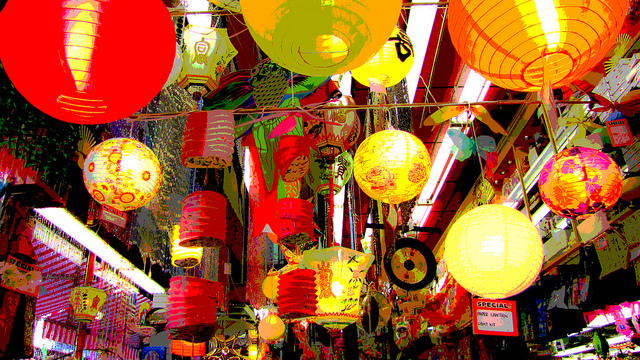Please talk to us about Preferences, Taboos and Superstitions
My friend Ken, an exchange student from Germany, currently studying Chinese history at Beijing Normal University, was really possessed by the desire to explore the interesting preferences, taboos ands superstitions of the Chinese culture. Here’s a few from his collections he would like to share.
– Chinese people often ask each other “Have you had dinner already?” They are not feeling hungry or asking you to treat them a dinner. It is a general greeting just like “How are you?”
– Ardent western gentlemen should be reminded that: your head will be ripped off if you kiss a Chinese woman in the cheek to show “fellowship”.
When you are considering choosing a gift for a Chinese friend, try to keep the following things in mind, as some really good stuff might have offensive meanings in Chinese culture:
– The green hat: in the Chinese language, “giving a green hat to a man” means to have an affair with his wife.
– Daisies and chrysanthemums are only good for funerals; Rule No.1: anything related to death is not favorable in China.
– The number 4 is similar to how westerners hate the number 13, Chinese people don’t like 4. In many high-rises, you will only find Floor 3, 3A and 5. It has nothing to do with religion. It’s just because the number sounds like “death”. Please refer to “Rule No. 1”.
– 250: moniker for brainless people.
– Clock: in Chinese, “giving some one a clock” shares the same pronunciation with “attending one’s funeral”.
– Book: sounds like “loss”.
– Shoes: sounds like “evil”.
– Umbrella: sounds like “break up”, the worst gift idea for wedding.
– Red Ribbons on the gift package are preferred; white ones are the last choice you want to make.
– Good or lucky numbers: “6” is symbol of success; “8” brings fortune, and many other number entail superstitions. I believe you have heard of stories that some Chinese throw thousands of dollars down the drain to get a phone number or license plate ending with “888”.
And thousands of Chinese dialects make things even complicated: Northern Chinese Dialect (including Mandarin, Sichuan Dialect, etc), Wu, Jiangxi, Hunan, Hakka, Cantonese, and Fujian dialects, etc. Shanghai residents often joke about a fine Italian restaurant “Va Bene” which recently opened a store in Shanghai, as “Va Bene”, which means success in Italian, but it unfortunately sounds like “expensive” in the Shanghai Dialect; in Hong Kong and Guangdong Province where Cantonese is spoken, people go crazy for a weird looking seaweed called “fa cai”, which means making a fortune in Cantonese.
Please explain the concept of “Lao Wai” and the Local Representative
As a result of China’s internationalization, more and more foreigners found good niches for themselves in the booming Chinese cities such as Beijing, Shanghai, Guangzhou and Shenzhen. There are tons of opportunities there, and the consumption level is considerably low. Once they figured out the strategies for successful adjustment to the culture, the only thing left on their “to do list” is to enjoy life. Meanwhile, residents of these big cities have also got accustomed to seeing a diversity of foreign faces around. Often referred to as “Lao Wai”, which means “an old foreign buddy” in Mandarin, foreigners are no longer a spectacular creature to the Chinese.
There are still obstacles that a “Lao Wai” has to overcome in order to do business complicated. And this could be fatal to a business or an individual aiming to succeed in China.
For example, an American company is in a business negotiation with a Chinese company. The American representative who is from a more straight forward cultural background, may want to start the negotiation with a simple and straight forward question such as “what do you want to achieve?”. This will create a really bad first impression right away, and make his Chinese partners feel that he is trying to observe sensational subjects that they have deep inside.
The other example is that many Americans also find it hard to understand the importance of dinner to doing business in China. They are often frustrated by thinking that it’s extremely inefficient to spend many more hours in a restaurant than in a meeting room; however, their Chinese partners consider it a successful business and networking strategy and are very excited about getting the contract signed on the dining table.
This is why a local representative is so important. He can not only cut down the odds that his “Lao Wai” boss may look silly, but also serve as a good stepping stone and a bridge that connects both ends. If a foreign company is to launch a brand in China, it is always safe to seek advice from local professionals. For one thing, they know the market and the culture very well. Second, they could tell “Lao Wai” investors if the brand name means anything negative in the local language so that they won’t open a second “Va Bene” in Shanghai.
Fortunately, years after China opened door to the outside world, Chinese people have obtained enough experience to put away most misunderstandings or inadvertent mistakes caused by cultural obstacles while dealing with foreigners. They are introducing advanced business theories and gradually switching to an international strategy. And foreign companies are also modifying their strategies to adjust to the Chinese market. The opportunities also brought more and more “Lao Wai” to China and quite a few of them are planning for their long-term development in China. It is just a learning process for all.
Thank you, Clare, for sharing your insights and giving us a better idea of Chinese culture.




